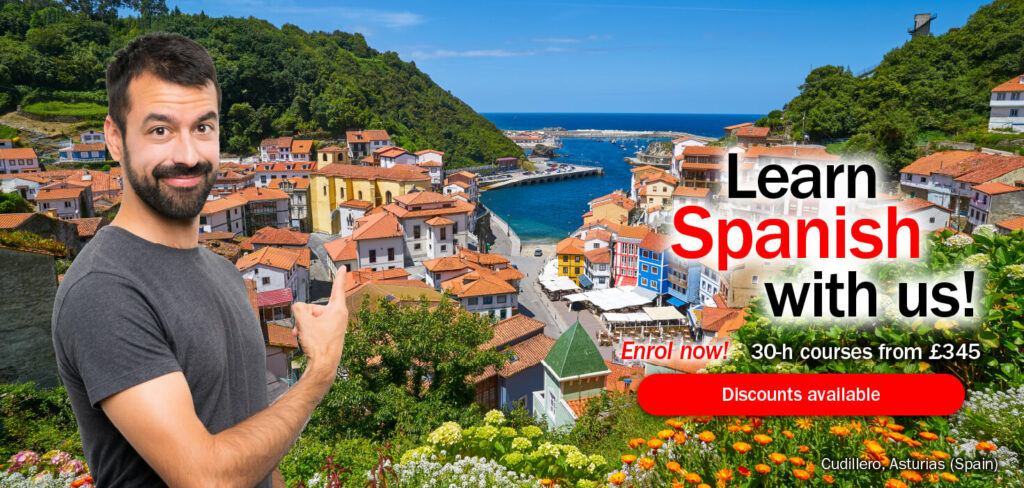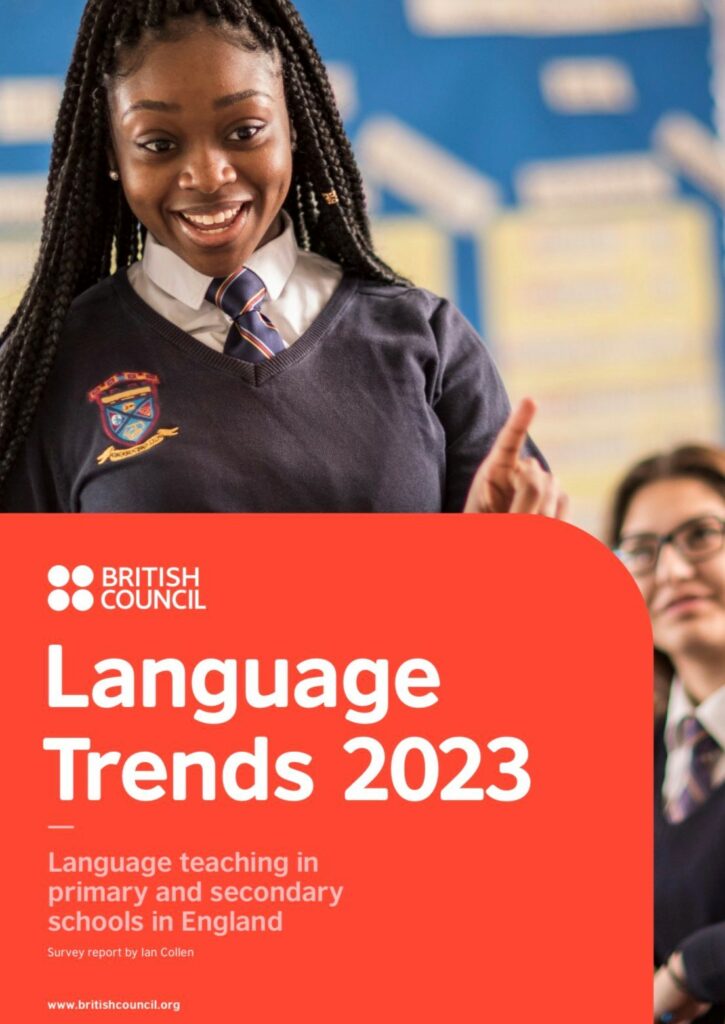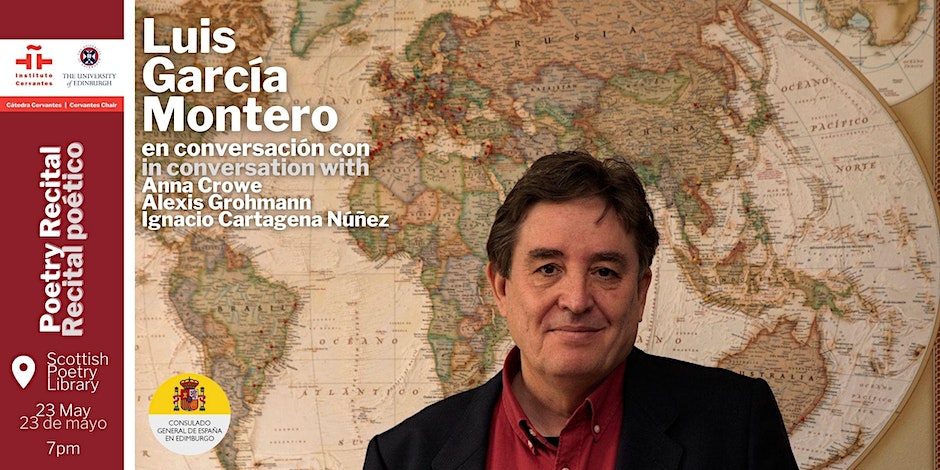New Spanish courses starting in January
¿Por qué aprender español? Hablada por casi 600 millones de personas, el español es la lengua oficial en 21 países. España es uno de los destinos vacacionales más populares para los británicos y el conocimiento del español puede mejorar los ingresos entre un 30 % y un 50 %. ¡Aprende español con nosotros!
Why learn Spanish? Spoken by almost 600 million people, Spanish is the official language in 21 countries. Spain is one of the most popular holiday destinations for the Brits and knowledge of Spanish can improve earnings by between 30% and 50%. Learn Spanish with us!
El español en cifras según el «El español en el mundo 2023. Anuario del Instituto Cervantes»
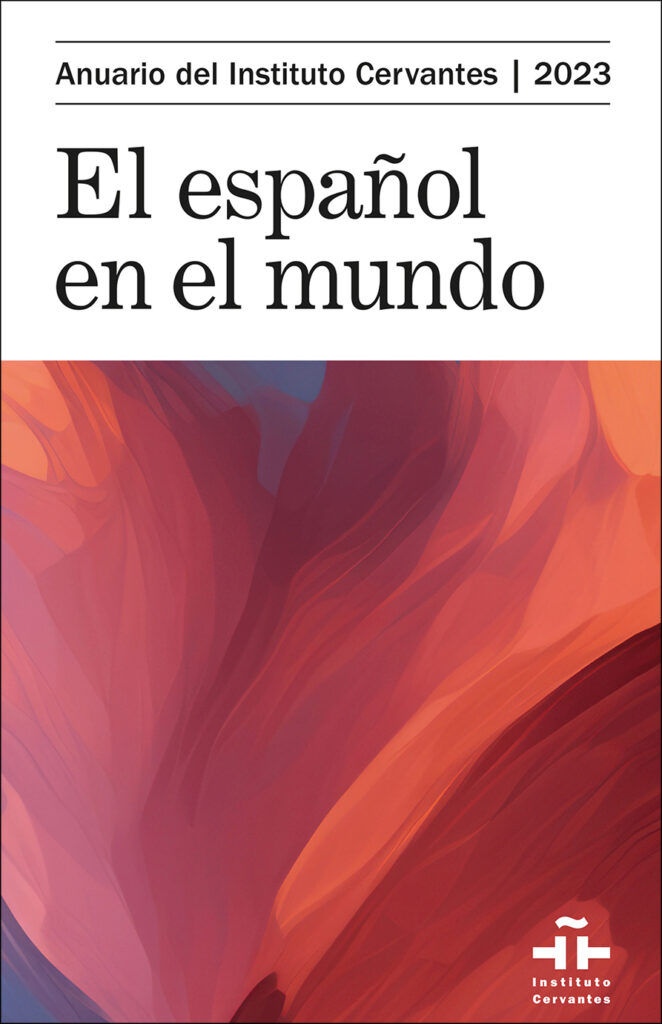
✅En 2023, casi 500 millones de personas tienen el español como lengua materna (el 6,2 % de la población mundial).
✅El grupo de usuarios potenciales de español en el mundo (cifra que aglutina al Grupo de Dominio Nativo, el Grupo de Competencia Limitada y el Grupo de Aprendices de Lengua Extranjera) supera los 599 millones (el 7,5 % de la población mundial).
✅El español es la segunda lengua materna del mundo por número de hablantes, tras el chino mandarín, y la cuarta lengua en un cómputo global de hablantes (dominio nativo + competencia limitada + estudiantes de español), después del inglés, el chino mandarín y el hindi.
✅ El número de hispanohablantes seguirá creciendo en las próximas cinco décadas, pero su peso relativo disminuirá de manera progresiva de aquí a final de siglo. En 2100, solo el 6,4 % de la población mundial podrá comunicarse en español.
✅ En 2060, Estados Unidos será el segundo país hispanohablante del mundo, después de México. El 27,5 % de la población estadounidense será de origen hispano.
✅Más de 23 millones de alumnos estudian español como lengua extranjera en 2023. En concreto, 23.035.198.

Puedes ver aquí la presentación de «El español en el mundo 2023. Anuario del Instituto Cervantes», la principal publicación académica de la institución, en la que cada año se actualizan los datos principales sobre la lengua española en el mundo:
Y consultar todo el el volumen en la web del Instituto Cervantes: https://cvc.cervantes.es/lengua/anuario/anuario_23/default.htm
Presentación de «El español en el mundo 2023. Anuario del Instituto Cervantes»
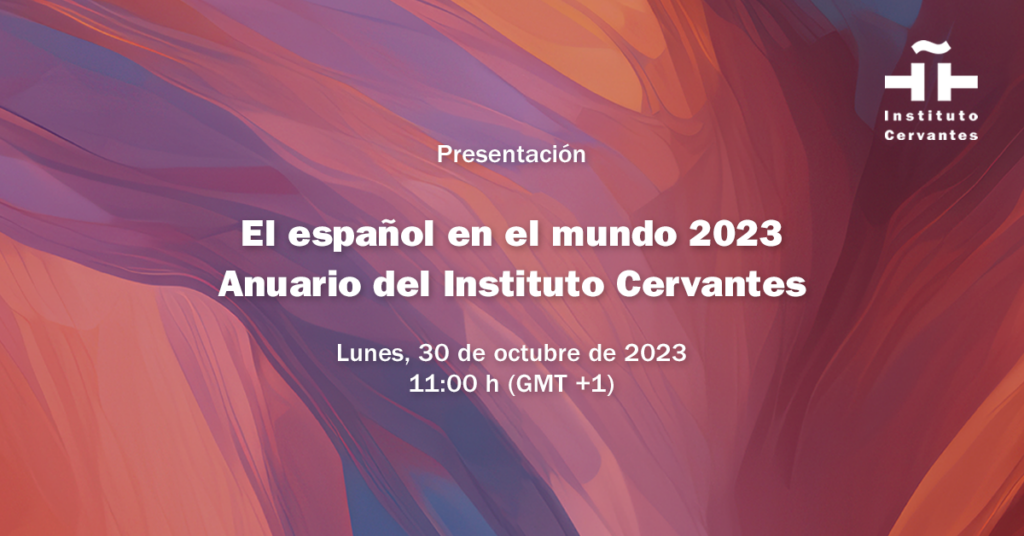
El Instituto Cervantes presenta el lunes 30 de octubre, a las 11 h (hora de Madrid), el anuario «El español en el mundo 2023», principal publicación académica de la institución en la que cada año se actualizan los datos más relevantes sobre la lengua española en el mundo, junto a otros asuntos de interés que atañen a la presencia internacional de la cultura hispánica.
Esta vigesimocuarta edición del Anuario del Instituto Cervantes aporta los últimos datos sobre la presencia internacional de nuestra lengua y detalla la situación específica del español en cinco países: Tailandia, Portugal, Ucrania, la República Democrática del Congo e Irán. Incluye además un amplio apartado titulado «Lenguajes para la inclusión», en el que seis autores reflexionan a lo largo de 120 páginas sobre la coexistencia de las lenguas de signos con el español, el lenguaje y la igualdad entre hombres y mujeres, la historia del braille, las pruebas de español para personas con trastornos como la dislexia o el lenguaje de la Administración.
En el acto de presentación pública, que cerrará José Manuel Albares, ministro en funciones de Asuntos Exteriores, Unión Europea y Cooperación, participarán:
• Luis García Montero, director del Instituto Cervantes
• Carmen Pastor Villalba, directora académica del Instituto Cervantes
• María Luz Esteban Saiz, directora del Centro de Normalización Lingüística de la Lengua de Signos Española (CNLSE)
• David Fernández Vítores, investigador y profesor de la Universidad de Alcalá (Madrid)
• Estrella Montolío Durán, catedrática de Lengua Española de la Universidad de Barcelona
• Andrés Ramos Vázquez, director general adjunto de servicios sociales de la Organización Nacional de Ciegos Españoles (ONCE)
19th London Spanish Film Festival: 20-27 September. Save the dates!
| Our lineup for our 19th edition includes films from all corners of Spain, new feature films, documentaries, international co-productions, shorts and some wonders from the archives. Our opening and closing nights are devoted to two of the films we are bringing from Andalusia and, as for the past several years, films from the Basque Country and Catalonia will have special sections celebrating the wealth of Spain’s cultural diversity. We’ve also partnered with Durham University’s Santiago Fouz-Hernández to bring to London audiences an essential part of their Bigas Luna Tribute. With the Tribute, a very small but very special exhibition that we will celebrate after the screening of Jamón, jamón with Alhambra beer and with our friends at Spanish Ham Master and… yes, jamón – the best! Check our program and make the most of this special occasion to see some truly great films on the big screen and meet talents from Spain! |
Full Programme London Spanish Book & Zine Fair
| The Fifth edition of the London Spanish Book & Zine Fair will take place on Saturday 7th and Sunday 8th October 2023. Way Home is the theme of the book and zine fair and we hope you can be part of it! With a lineup that includes acclaimed writers Cecilia Szperling (Argentina), Andrea Jeftanovic (Chile), Lucía Asué Mbomío Rubio (Spain) and Ángela Nzambi (Equatorial Guinea), among others, the Way Home edition promises many surprises and encounters: Theatre in Translation with Out of the Wings; Queer poets: Love in a new age; Writers in no man’s land; Paste Up activities with London International Paste Up Festival; LO(R)CA me tienes with Ana Gomila Domènech and so much more. Full Programme More than 40 exhibitors will be present at this year’s edition. The fair will take place over two full days and the programme will include talks, exhibitors stalls, creative writing, poetry and zine workshops, an outdoor paste up activity, storytelling for children and a Poetry Open Mic. Bilingual activities (English/Spanish). Indoor Cafe and so much more!Meet publishers, writers, translators, fanzine makers, illustrators and open minded readers interested in the Spanish language. The London Spanish Book & Zine Fair is free to attend but you need to register beforehand on Eventbrite.Workshops are free and paid and you need to additionally register for each one (Book your Workshop). Places are limited. |

Fifth Edition of the London SpanishBook & Zine Fair
Saturday 7th and Sunday 8th October 2023
The Crypt at St Peter’s
Liverpool Grove
London SE17 2HH (see map)
Note: The venue has disabled access
OPENING TIMES
Saturday 7th October 2023: 11 am to 5 pm
Sunday 8th October 2023: 12.30 pm to 5 pm
Organized by La Tundra Revista since 2019.
We would like to thank to our funders, sponsors, friends and collaborators for making this edition of the book and zine fair possible: Arts Council England, Instituto Cervantes London, Argentine Embassy in London, Victorina Press, Mexican Cultural Centre, London International Paste Up Festival and Arts House Project London.
Spanish is the most popular A-level language in schools across England for the fourth year running
The British Council presented today the results of the Language Trends England 2023 report.
- For the fourth year running, Spanish continues to have the highest number of A-level entries.
- Official exam data show that, for the fourth year running, Spanish is the most popular language at A-level, replacing the long-standing tradition of French being in the top spot. The diverging trends noted in the graph below would suggest that Spanish now has the highest A-level entries and it is predicted that this trend will continue in future cohorts. It is interesting to recall that French continues to be the most taught language in primary schools.

- The three most popular languages on the school curriculum in England are French, German and Spanish.

- French continues to be the most popular language at Key Stage 3 (ages 11-14), taught in 87 per cent of responding state schools and 97 per cent of responding independent schools, followed closely by Spanish in 75 per cent and 93 per cent of state and independent schools respectively.
- French, German and Spanish remain the ‘big 3’ curricular languages; with planned revisions to the GCSE specifications in these languages to take place from 2024, there are exciting times ahead in the study and research of future language trends in England.
Read the whole Language Trends England 2023 report here.
La primera Cátedra Cervantes se inaugura el miércoles en la Universidad de Edimburgo
El director del Instituto Cervantes, Luis García Montero, viaja a Reino Unido donde este miércoles, 24 de mayo, inaugurará la Cátedra Cervantes en la Universidad de Edimburgo, una iniciativa dedicada a impulsar la enseñanza y promoción del español y de la cultura hispánica en Escocia. Dependiente del Instituto Cervantes de Mánchester, supone el establecimiento de la primera extensión de la institución en la capital escocesa. Alexis Grohmann, hispanista y catedrático de Literatura Española Contemporánea, ocupará la cátedra.
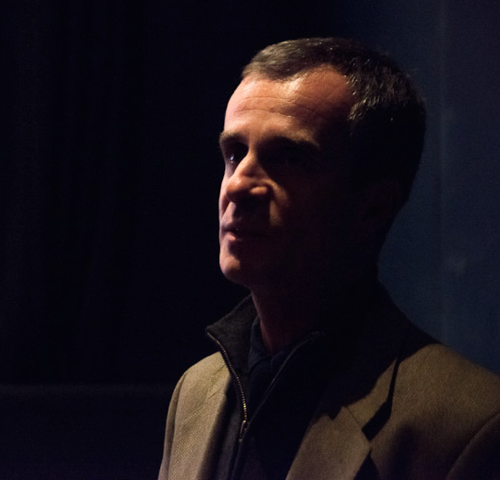
Para el desarrollo de su actividad, la Cátedra Cervantes contará con el respaldo del departamento de español Universidad de Edimburgo, con un siglo de historia; con la figura del Catedrático Cervantes, profesor de la propia universidad quien apoyará la labor del Instituto Cervantes; y con la cesión de los espacios necesarios para la realización de cursos de formación de profesores y programas culturales.
Al acto de inauguración asistirán, además de García Montero, el rector de la Universidad de Edimburgo, Peter Mathieson; la directora Académica del Instituto Cervantes, Carmen Pastor; el cónsul general de España en Edimburgo, Ignacio Cartagena, y el nuevo Catedrático Cervantes, Alexis Grohmann.
Esta iniciativa nace con el apoyo de las autoridades escocesas, como se puso de relieve en el encuentro que mantuvo García Montero (en una visita previa a la capital escocesa) con el vicepresidente del parlamento escocés, Liam McArthur; y en una posterior visita del ministro de Constitución, Asuntos Exteriores y Cultura del Gobierno de Escocia, Angus Robertson, a la sede central del Cervantes en Madrid.
La Universidad de Edimburgo, fundada en 1583, es una de las más grandes y prestigiosas del Reino Unido. La enseñanza del español en Escocia en los últimos años ha tenido un crecimiento sostenido, un hecho que puso de relieve el informe Language Trends, del British Council, que mostraba el afianzamiento del idioma español como la lengua extranjera más demandada por los estudiantes de secundaria en todo el Reino Unido.
Agenda de García Montero en Edimburgo
El programa en la ciudad escocesa arrancará este martes 23 de mayo con la celebración de un recital en la Biblioteca de la Poesía en el que participarán, junto a Luis García Montero, la poeta y traductora Anna Crowe y el catedrático Alexis Grohmann, además de cónsul General de España en Edimburgo, Ignacio Cartagena.
Al día siguiente, en el consulado, el director del Cervantes se reunirá con el profesor de Lingüística Hispánica y coordinador de los programas de enseñanza en línea del Departamento de Lenguas y Culturas Europeas de la Universidad de Edimburgo, Carlos Soler.
Ese mismo día, 24 de mayo se celebrará la inauguración de la Cátedra Cervantes en la Universidad de Edimburgo (a las 18:30 h —hora local de Escocia—), acto en el que intervendrán el rector de la Universidad de Edimburgo, Peter Mathieson, el director del Cervantes, Luis García Montero, el cónsul general de España, Ignacio Cartagena Nuñez y el Catedrático Cervantes Alexis Grohmann.
Catedrático de Literatura Española Contemporánea en la School of Literatures, Languages and Cultures, Grohmann es, además, director de la Cátedra Arturo Pérez-Reverte, en la Universidad de Murcia y académico correspondiente extranjero, de la Real Academia Española. Autor de un centenar de publicaciones, entre sus trabajos destaca la investigación acerca de los autores Javier Marías y Arturo Pérez-Reverte, sobre los que ha publicado sendos ensayos.
El español en Escocia
Con cinco millones de habitantes, Escocia es una de las cuatro regiones administrativas que integran el Reino Unido —junto con Inglaterra, Gales e Irlanda del Norte—. Su capital, Edimburgo, destaca por su gran oferta cultural y proyección internacional con numerosos festivales como el Festival Internacional del Teatro de Edimburgo y el Festival Internacional de las Artes de Edimburgo
En los últimos años la enseñanza del español ha crecido regularmente en el país pese al declive gradual de la enseñanza de lenguas extrajeras en la región. Asimismo, los informes del British Council Language Trends constatan que el español es una de las lenguas estratégicamente más importantes para el Reino Unido.
Actualmente se enseña español en casi la mitad de las escuelas de primaria y en dos tercios de los institutos de secundaria lo ofrecen como lengua tercera, sin embargo, existe una gran necesidad de programas de formación a profesores de español para atender a la demanda.
Próximo programa de actividades académicas y culturales
La Cátedra Cervantes plantea en el ámbito académico un programa de formación de profesores con el DADIC (Diploma de Acreditación Docente) que incluirá la observación de clases en la Universidad de Edimburgo para los profesores participantes, un curso sobre la legua de herencia o la oferta de cursos de español para profesores utilizando la plataforma AVE.
Entre las actividades culturales, participará en la Feria del Libro de Edimburgo, el Festival de Cine Español de Edimburgo, el Simposio internacional de poesía española en la Universidad de Saint Andrews, y la celebración de una mesa redonda sobre la figura de Javier Marías en Reino Unido.
The University of Edinburgh welcomes the first Cervantes Chair on Wednesday 23rd May
The director of the Instituto Cervantes, Luis García Montero, travels to the United Kingdom where on Wednesday he will inaugurate the Cervantes Chair at the University of Edinburgh, an initiative dedicated to the stimulation of the teaching and promotion of the Spanish language, and the dissemination of Hispanic culture in Scotland. Dependent on the Instituto Cervantes in Manchester, this event heralds the official establishment of the first extension of the institution in the Scottish capital. Alexis Grohmann, hispanist and Professor of Contemporary Spanish Literature, will occupy the Cervantes chair.

For the development of its activity, the Cervantes Chair will have the support of the Spanish Department at the University of Edinburgh, with its century of history. The figure of the Cervantes Professor, a professor from the university itself, will support the work of the Cervantes Institute. The activity of the extension will also be developed via the assignment of the necessary spaces for the realization of teacher training courses and cultural programmes.
The inauguration ceremony will be attended by the Principal of the University of Edinburgh, Peter Mathieson; the Academic Director of the Instituto Cervantes, Carmen Pastor; The Consul General of Spain in Edinburgh, Ignacio Cartagena, and the Cervantes Professor, Alexis Grohmann; as well as by Luis García Montero himself.
This initiative was developed with the support of the Scottish authorities, as highlighted in the meeting held by García Montero (on a previous visit to the Scottish capital,) with the Deputy President of the Scottish Parliament, Liam McArthur; and in a subsequent visit, with the Minister for Constitution, Foreign Affairs and Culture of the Scottish Government, Angus Robertson, at the Instituto Cervantes Headquarters in Madrid.
The University of Edinburgh, founded in 1583, is one of the largest and most prestigious universities in the United Kingdom. The teaching of Spanish in Scotland has experienced a sustained increase in recent years, a fact highlighted by the British Council’s Language Trends report, which showed the consolidation of the Spanish language as the foreign language most demanded by secondary school students throughout the United Kingdom.
García Montero’s Agenda in Edinburgh
García Montero’s programme in the Scottish city will begin on Tuesday, 23rd May, with a Poetry Recital at the Scottish Poetry Library, in which the poet and translator Anna Crowe and Professor Alexis Grohmann, as well as Consul General of Spain in Edinburgh, Ignacio Cartagena will participate alongside Luis García Montero.
The following day, the Director of the Instituto Cervantes will meet, at the Consulate of Spain, with the lecturer of Hispanic Linguistics and coordinator of the online teaching programs of the Department of European Languages and Cultures of the University of Edinburgh, Carlos Soler.
On the same day, the 24th May, the inauguration of the Cervantes Chair will be held at the University of Edinburgh (at 6:30 p.m. local time in Scotland.) The Principal of the University of Edinburgh, Peter Mathieson, will address attendees, as well as the director of the Cervantes, Luis García Montero, the consul general of Spain, Ignacio Cartagena Nuñez and the Cervantes Professor Alexis Grohmann.
Professor of Contemporary Spanish Literature at the School of Literatures, Languages and Cultures, Grohmann is also director of the Arturo Pérez-Reverte Chair at the University of Murcia and foreign correspondent of the Royal Spanish Academy. Author of more than a hundred publications, his works include numerous books on the authors Javier Marías and Arturo Pérez-Reverte.
Spanish in Scotland
With a population of five million, Scotland is one of the four devolved regions constituting the United Kingdom, alongside England, Wales, and Northern Ireland. Its capital, Edinburgh, stands out for its great cultural offer and international projection with numerous festivals such as the Edinburgh International Theatre Festival and the Edinburgh International Festival of the Arts.
In recent years, the teaching of Spanish has grown steadily in the country despite the gradual decline in the teaching of foreign languages in the region. Likewise, the British Council report Language Trends confirm that Spanish is one of the most strategically important languages for the United Kingdom.
Spanish is currently taught in almost half of UK primary schools, with two thirds of secondary schools offering Spanish as a third language. This being said, there is a great need and demand for training programmes for Spanish teachers , in order to keep up with current trends.
Upcoming programme of academic and cultural activities
In the academic field, the Cervantes Chair proposes a teacher-training programme focussed on the DADIC (Diploma of Teaching Accreditation) that will include the observation of classes at the University of Edinburgh for participating teachers, a course on the Heritage Languages, as well as Spanish courses for teachers using the AVE platform.
In regards to cultural activities, the chair will participate in the Edinburgh Book Fair, the Edinburgh Spanish Film Festival, the International Symposium of Spanish Poetry at the University of Saint Andrews, and the celebration of a round table on the figure of Javier Marías in the United Kingdom.
The 12th Spring Weekend of the London Spanish Film Festival is here!
The London Spanish Film Festival Spring Weekend returns from 1 to 4 June to Ciné Lumière for its 12th edition with three wonderful debut feature films.
These include Juan Diego Botto’s magnificent as well as important On the Fringe, which features powerful performances by Luis Tosar and Penélope Cruz, as well as the latest film by Cesc Gay, Stories Not to Be Told.
As part of the program, two special screenings: one paying homage to the genius of Pablo Picasso on the 50th anniversary of his death, and one about a very special journey of discovery by flamenco singer Niño de Elche.
The 19th edition of the London Spanish Film Festival will take place from 20 to 28 September 2023.
